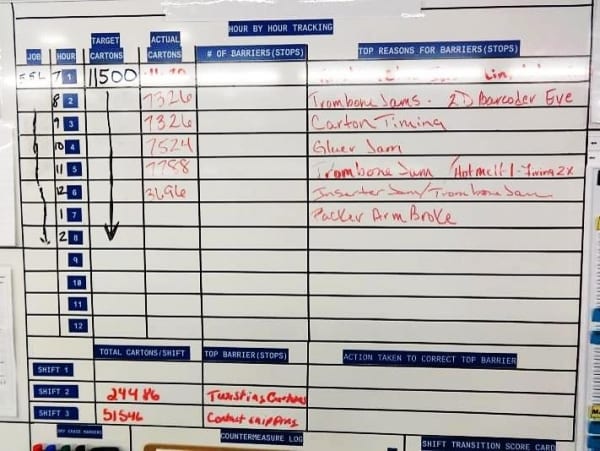Daily Management
Description:
How is our team doing right now? What are the current obstacles? What is the latest status on customer orders? Making these metrics visual is a key part of TGG’s daily management service and prompts ownership and resolution.
Daily management allows your team to:
- Know when a process abnormality has occurred. Hour by hour – are we winning or losing?
- What counter-measures have been engaged to identify root cause, and then to communicate plans and responsibilities
- Implement ‘tiered’ meetings that allow information to flow up and down the organization chain of command effortlessly and at a) timed intervals and b) using standard meeting protocol
These dashboards are vital to all businesses
How Fast Does Bad Information Travel ‘Up’ In Your Business?
Good? An opportunity to improve by determining what process failed
Bad? Blame game focusing on results (not process)
There are several common extensions of daily management that are noteworthy.
- Coaching on how to improve performance. Once TGG implements daily management with your managers, supervisors, and line leads, we’ll extend review of metrics to ToyotaKata questions. ToyotaKata is an excellent method that we use to help teams utilize PDCA to improve their operational, capacity, and financial metrics.
Mike Rother’s ToyotaKata questions are:
What is the target condition?
What is the actual condition now?
What are the current obstacles?
What is your next step?
When can we go see what we learned from taking that step?
- Gather more data, better data. “A problem that is well described is half solved” – it’s a statement that has been used many (many) times within the field of Lean Six Sigma. Often once the daily management process is implemented teams recognize that first level Pareto information isn’t enough to get to root cause. That’s when we understand that we need more data, better data, in order to build second and third level Pareto graphs.
- Scientists. “None of us is as smart as all of us.” “With every two hands you get a free brain.” The power of your people is infinitely powerful. Using daily management we’ll begin to answer your employee’s questions … with questions. The power of observation is an awesome skill to awake within your organization – for every employee.
Please contact TGG with your problem statement and let us lead the charge using daily management within your organization.
Duration:
3 Days SCO
12 Days RUN (4 sessions)
2 Days Evaluate
Typical Outcomes:
- Tier 1, 2, and 3 level daily management boards
- Use of a ‘linkage chart’ to connect your metrics with underlying processes
- Connect daily management to ToyotaKata, Leader Standard Work, and other visual standard work within your organization
- Managers learn how to implement coaching sessions using ToyotaKata
- TGG will facilitate your team to “Aggressively deselect” metrics until those that are vital are identified






